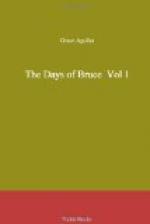Obedient to these commands, all England speedily appeared in motion, the troops of every county moving as by one impulse to Carlisle. Yet there were some of England’s noblest barons in whose breasts a species of admiration, even affection, was at work towards the very man they were now marching to destroy, and this was frequently the case in the ages of chivalry. Fickle as the character of Robert Bruce had appeared to be, there was that in it which had ever attracted, riveted the regard of many of the noble spirits in King Edward’s court. The rash daring of his enterprise, the dangers which encircled him, were such as dazzled and fascinated the imagination of those knights in whom the true spirit of chivalry found rest. Pre-eminent amongst these was the noble Earl of Gloucester. His duty to his sovereign urged him to take the field; his attachment for the Bruce would have held him neuter, for the ties that bound brothers in arms were of no common or wavering nature. Brothers in blood had frequently found themselves opposed horse to horse, and lance to lance, on the same field, and no scruples of conscience, no pleadings of affection, had power to avert the unnatural strife; but not such was it with brothers in arms—a link strong as adamant, pure as their own sword-steel, bound their hearts as one; and rather, much rather would Gloucester have laid down his own life, than expose himself to the fearful risk of staining his sword with the blood of his friend. The deepest dejection took possession of his soul, which not all the confidence of his sovereign, the gentle, affectionate pleadings of his wife, could in any way assuage.




